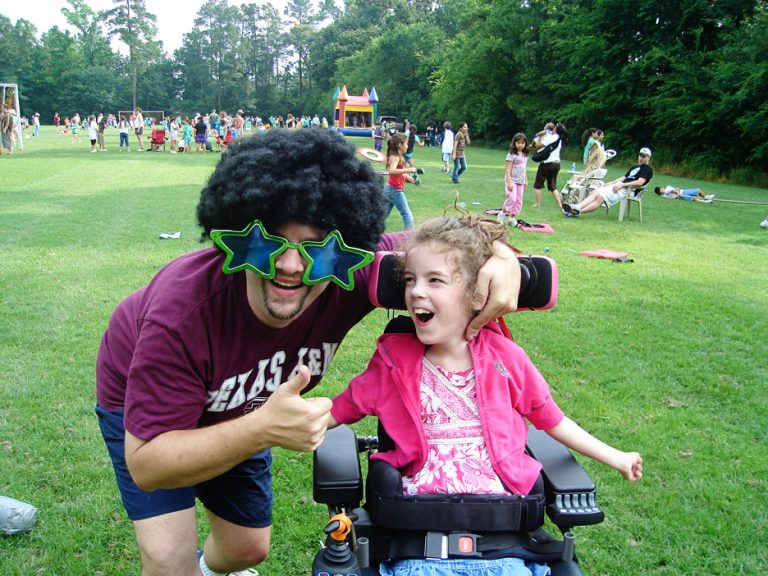
At first, I was fixated on how to FIX the PROBLEM. That’s what dads do, right? … I believed that if we worked hard enough we could solve [everything. Well, years later] I’m proud to say one of my greatest accomplishments in life is that I have played a part in my daughter becoming an independent woman [physical paralysis and all] who will not hesitate to take on the world.
–Peter Fry, husband of Andi Fry and father of Megan
Neuroscience tells us that brains have “gender” traits (usually, though not always, matching physical gender). One typically “male” trait is the drive to do something about every concern. So if you’re a father and your child has a disability, you’re perfectly typical if you want to “fix” the disability—and if you get frustrated when there’s no major breakthrough in sight.
Coping Hacks: Putting Discouragement in Its Place
When you’re feeling really frustrated, it’s tempting to become irritable and distant. Don’t. Instead:
- Admit that you are frustrated/disappointed/discouraged/angry/feeling helpless. Acknowledging these emotions—even just to yourself—lessens their power over you.
- Determine to accept your limitations. Acknowledge what you can’t do, let it go, and you’ll be better able to see what you can do (more on that in a minute).
- Go ahead and get away from the situation for a while. Just make sure to choose healthy “getting away” activities: sports, exercise, creative hobbies. Avoid retreating into passive screen time or, worse, alcohol and drugs.

Coping Hacks: Keeping Relationships Strong
Men generally feel less guilty than women about taking “me time” for themselves. This is a good thing so long as “me time” recharges you for family responsibilities. However, you may have a wife/partner who doesn’t always see it that way: overwhelmed herself by “the kids need me 24/7” feelings, she may resent your taking any time for yourself. Or even your suggesting that she needs a little rest and a little fun.
It rarely helps this situation (or any household stress issue) if you argue “be reasonable.” Some better ways to strengthen family relationships:
- If you’re annoyed about something specific, speak up using the “I statement” approach. (E.g., “I really need twenty minutes to unwind, but I’d be glad to talk after dinner.” Not, “Why can’t you pipe down and give me a little peace?!”)
- Accept others’ feelings, even if you can’t understand them.
- Do stay willing to lend a hand around the house. (Especially when your partner is working at anything requiring physical exertion, never just “sit around” letting her sweat.)
- Spend some weekly one-on-one time with each member of your household. Also, take a couple of evenings a week to do something together as a family.
- Take turns picking family activities, rather than letting one person (or the majority) dominate. And if one child just can’t stomach someone else’s choice, try splitting into two groups. Or let the child do their own favorite activity on the sidelines.

Coping Hacks: The Right Approach to “Doing Something”
Even with all the above, you probably still want to “do something” about your child’s disability. Actually, there’s plenty you can—and should—do. It’s unlikely that the disability is “curable,” but the more important goal is helping your child become an independent, confident adult.
- Put your problem-solving and organization skills to use. Help create housework and homework schedules; help your child choose an AAC app; go to doctors’ appointments, IEP meetings, and anywhere else you can be an advocate for your family’s needs.
- Also attend family support groups and therapy sessions. Everyone needs regular empathy and good advice.
- Let your kids help with chores. Whatever their ages or abilities, and whether you’re folding the laundry or raking the yard, there’s always some way they can contribute. They’ll learn skills that will come in handy all their lives, and you’ll both enjoy the benefits of “bonding time.”
- Be a coach for your kids. Compliment their strengths, work with them to generate goals, and keep cheering them on to do things for themselves.
Finally, remember: “Taking action” and “talking about the problem” are teammates, not opponents. When they work together, they generate more and better approaches to a challenge. Things go best when every team member plays the position that comes naturally—and when everyone values everyone else’s contribution.
Helpful Apps
For keeping your brain (and problem-solving skills) sharp:
For organizing schedules and goals:
For having fun with your family:

